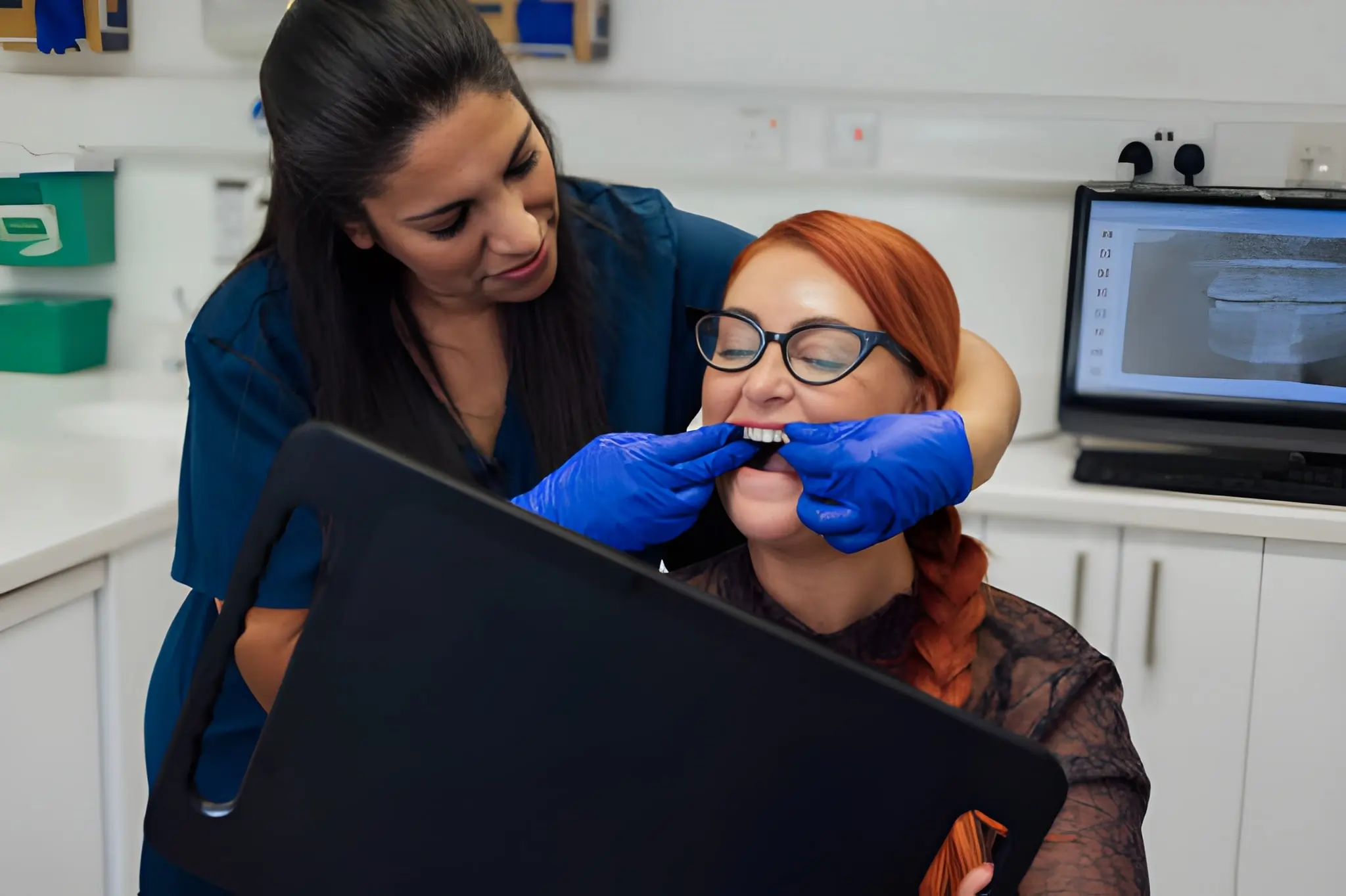A confident smile is a universal asset, profoundly impacting an individual’s self-esteem, social interactions, and overall quality of life. However, dental imperfections such as chips, gaps, discolouration, or missing teeth can cause individuals to feel self-conscious, hindering their willingness to smile freely. For those in Newcastle seeking to reclaim their confidence and oral function, modern dentistry offers two highly effective yet distinct solutions: composite bonding and dental implants. These treatments cater to different needs and goals, from minor cosmetic enhancements to the complete restoration of lost teeth. This comprehensive guide provides an in-depth exploration of both Composite Bonding Newcastle and Dental Implants Newcastle treatments, offering clarity for anyone considering their options for smile restoration.
The Psychological Impact of a Smile
Before delving into the technicalities of each procedure, it is valuable to understand why such treatments are in high demand. A smile is not merely an aesthetic feature; it is a fundamental component of non-verbal communication. Research consistently shows that a healthy, attractive smile is associated with perceptions of happiness, success, and approachability. Conversely, individuals who are dissatisfied with their teeth may experience heightened anxiety in social or professional settings, potentially leading to avoidance behaviours. Therefore, investing in dental restoration is often an investment in one’s mental and emotional well-being. The decision to pursue treatment, whether it be the swift artistry of Composite Bonding Newcastle or the permanent foundation of Dental Implants Newcastle, is the first step toward a positive transformation.
Composite Bonding Newcastle The Art of Cosmetic Enhancement
What is Composite Bonding?
Composite bonding, often referred to as dental bonding or tooth bonding, is a minimally invasive cosmetic dental procedure designed to correct minor imperfections in the teeth. It involves the application of a high-quality, tooth-coloured composite resin material that is meticulously sculpted and polished to blend seamlessly with the natural dentition. This versatile treatment is an ideal solution for addressing a range of concerns, including:
- Chipped or Cracked Teeth: Repairing small fractures on the edges of front teeth.
- Gaps Between Teeth: Closing diastemas (small spaces) without the need for orthodontics.
- Discolouration: Masking stains that do not respond to professional teeth whitening.
- Misshapen Teeth: Reshaping teeth to create a more harmonious and symmetrical smile.
- Exposed Tooth Roots: Covering areas of recession to reduce sensitivity and improve appearance.
The Composite Bonding Procedure: A Step-by-Step Guide
One of the most significant advantages of Composite Bonding Newcastle treatments is their simplicity and efficiency. The process is typically completed in a single visit to the dental practice, often without the need for anaesthesia unless a filling is also being placed.
- Consultation and Planning: The journey begins with a thorough consultation. The dentist discusses the patient’s goals, examines their oral health, and determines if composite bonding is the most appropriate solution. Digital photographs or smile design software may be used to plan the outcome and set clear expectations.
- Shade Selection: Using a shade guide, the dentist expertly matches the composite resin colour to the patient’s adjacent natural teeth, ensuring a flawless, undetectable blend.
- Tooth Preparation: The surface of the tooth receiving the bonding is gently cleaned and etched with a conditioning gel. This creates a microscopically rough surface, which is essential for achieving a strong bond between the tooth and the resin. The tooth is then rinsed and dried.
- Application of Bonding Agent: A liquid bonding agent is applied to the prepared tooth surface, which acts as a powerful adhesive.
- Layering the Composite Resin: The putty-like composite resin is applied, moulded, and sculpted directly onto the tooth. The dentist uses artistic skill to shape the material, replicating the natural contours and anatomy of a tooth.
- Curing: A special dental curing light is used to harden each layer of the resin. This light triggers a chemical reaction that sets the material into a durable state.
- Finishing Touches: Once the desired shape is achieved and fully hardened, the dentist trims, shapes, and polishes the bonded tooth. This final polishing step is crucial for achieving a natural lustre and smooth feel, making the restoration indistinguishable from the natural teeth.
Why Choose Composite Bonding Newcastle? Advantages and Considerations
The popularity of Composite Bonding Newcastle services stems from a host of compelling benefits:
- Minimally Invasive: Unlike veneers or crowns, composite bonding typically requires little to no removal of the natural tooth enamel. This preserves the tooth’s structure.
- Speed and Convenience: Most treatments are completed in one appointment, providing instant aesthetic results.
- Cost-Effectiveness: It is generally the most affordable cosmetic dental treatment available, making smile enhancement accessible to a wider audience.
- Reversibility: As the tooth structure is largely preserved, the procedure is considered reversible, offering flexibility for future treatment changes.
- Natural Aesthetics: Modern composite materials offer excellent aesthetics, with a wide range of shades and translucencies.
However, patients must also consider its limitations. Composite resin is not as stain-resistant as porcelain, so consumption of coffee, tea, or red wine may require more diligent oral hygiene. The material is also less durable than crowns or implants and can chip over time, typically lasting between 5 to 10 years before potentially needing maintenance or replacement. It is not a solution for severely damaged teeth or for replacing missing teeth.
Ideal Candidate for Composite Bonding in Newcastle
The ideal candidate for Composite Bonding Newcastle is an individual with good general oral health who wishes to address specific, minor cosmetic concerns. They should have realistic expectations about the longevity of the bonding and be committed to maintaining good oral hygiene practices and attending regular dental check-ups.
Dental Implants Newcastle The Gold Standard in Tooth Replacement
What Are Dental Implants?
While composite bonding enhances existing teeth, dental implants are a comprehensive solution for replacing missing teeth. A dental implant is a small, biocompatible titanium or zirconia post that serves as an artificial tooth root. Surgically placed into the jawbone, it provides a permanent foundation for a replacement tooth (a crown), a bridge, or even a full denture. The concept of Dental Implants Newcastle represents a paradigm shift in restorative dentistry, moving away from removable appliances or tooth-supported bridges toward a stable, integrated solution.
The Science Behind Implants: Osseointegration
The success of dental implants hinges on a biological process called osseointegration. Titanium, the material most commonly used for implants, has a unique property: it can fuse directly with the living bone tissue in the jaw. After the implant is placed, the bone cells grow and attach to the implant surface over a period of three to six months. This fusion creates an incredibly strong and stable anchor, mimicking the function of a natural tooth root. This process is what sets Dental Implants Newcastle apart from other tooth replacement options, as it provides unparalleled stability and prevents bone loss.
The Dental Implant Procedure: A Multistage Journey
The process of receiving Dental Implants Newcastle is more complex and lengthy than composite bonding, requiring surgical intervention and a healing period. It typically unfolds over several months.
- Comprehensive Assessment and Treatment Planning: This is a critical first step. The dentist uses advanced 3D Cone Beam CT scans to assess the quantity and quality of the jawbone, identify the precise location of nerves and sinuses, and plan the implant placement with pinpoint accuracy. This digital planning ensures the highest chance of success.
- Bone Grafting (if required): If a patient has insufficient bone volume due to prolonged tooth loss or periodontal disease, a bone graft may be necessary to create a solid foundation for the implant. This step can add several months to the overall timeline.
- Surgical Placement of the Implant: Under local anaesthesia (often with sedation options for comfort), the dentist makes a small incision in the gum to expose the jawbone and precisely places the implant post. The gum is then stitched closed over or around the implant.
- Healing and Osseointegration Phase: A period of healing, typically lasting 3-6 months, follows. During this time, the jawbone gradually fuses with the implant in a quiet, undisturbed process.
- Abutment Placement: Once osseointegration is confirmed, a minor second procedure is performed to attach an abutment to the implant. This connector piece protrudes slightly above the gum line and will ultimately hold the replacement tooth.
- Crown Fabrication and Attachment: After the gums heal around the abutment, impressions are taken to craft a custom-made dental crown. This crown is designed to match the colour, shape, and size of the surrounding natural teeth. It is then securely attached to the abutment, completing the restoration.
Types of Dental Implants Available in Newcastle
Clinics offering Dental Implants Newcastle provide various solutions to meet diverse patient needs:
- Single Tooth Implants: The most common type, used to replace one missing tooth without affecting the adjacent healthy teeth.
- Implant-Supported Bridges: When several teeth are missing in a row, two or more implants can support a fixed bridge, eliminating the need for a removable partial denture.
- Implant-Retained Dentures (All-on-4®/All-on-6®): For patients who are missing all or most of their teeth in an arch, a full set of teeth can be supported by just four or six strategically placed implants. This provides a fixed, non-removable solution that is far superior to traditional dentures in terms of stability and function.
- Zygomatic Implants: For patients with severe bone loss in the upper jaw who are not candidates for bone grafting, longer implants can be anchored in the cheekbone (zygoma), offering a complex but effective solution.
Why Choose Dental Implants? The Profound Benefits
The investment in Dental Implants Newcastle is justified by a multitude of long-term benefits:
- Permanent Solution: Implants are designed to last a lifetime with proper care, unlike bridges or dentures which may need replacement every 5-15 years.
- Preservation of Jawbone: By replacing the tooth root, implants stimulate the jawbone, preventing the bone resorption that inevitably occurs after tooth loss. This maintains facial structure and prevents a prematurely aged appearance.
- Unmatched Functionality: Implants restore near-natural biting and chewing capacity, allowing individuals to eat all their favourite foods without hesitation.
- Improved Oral Health: Unlike a traditional bridge, which requires grinding down adjacent healthy teeth, implants stand independently, preserving the integrity of neighbouring teeth.
- Confidence and Convenience: They eliminate the slippage and discomfort associated with dentures and do not require adhesives. Patients can speak, laugh, and eat with complete confidence.
Ideal Candidate for Dental Implants in Newcastle
A suitable candidate for Dental Implants Newcastle is generally in good general health and has healthy gums. Adequate bone density is crucial to support the implant. While smoking and conditions like uncontrolled diabetes can affect healing and success rates, they do not automatically disqualify a patient; a thorough assessment is necessary. Patients must also be committed to meticulous oral hygiene and regular dental visits to ensure the long-term health of the implant.
Composite Bonding vs. Dental Implants: A Clear Comparison
Understanding the fundamental differences between these two treatments is key to making an informed decision. They are not interchangeable but rather serve complementary roles in dental care.
| Feature | Composite Bonding | Dental Implants |
| Primary Purpose | Cosmetic enhancement of existing teeth. | Replacement of missing teeth. |
| Invasiveness | Minimally invasive, little to no tooth reduction. | Surgical procedure requiring healing. |
| Procedure Time | Typically one visit (1-2 hours per tooth). | Multiple visits over 3-9 months. |
| Longevity | 5-10 years (with potential for maintenance). | Can last a lifetime with proper care. |
| Cost | Lower initial cost. | Higher initial investment. |
| Impact on Oral Health | Cosmetic; does not strengthen the tooth. | Preserves jawbone and improves function. |
| Ideal For | Chips, cracks, gaps, discolouration. | Single or multiple missing teeth. |
Costs and Long-Term Considerations in Newcastle
The cost of Composite Bonding Newcastle is typically calculated per tooth. It is the most budget-friendly cosmetic option, with prices varying based on the extent of work required. While affordable upfront, patients should factor in the potential for periodic polishing or repair over the years.
The investment for Dental Implants Newcastle is significantly higher, reflecting the surgical expertise, advanced technology (like CT scans), quality of materials, and time involved. The cost is usually quoted per implant and per crown. Although the initial outlay is greater, implants are often more cost-effective over a lifetime due to their durability and the avoidance of future procedures on adjacent teeth, which bridges might necessitate.
The Importance of Choosing an Expert Clinic in Newcastle
The success of both composite bonding and dental implant procedures is heavily dependent on the skill and experience of the dental team. Whether seeking the artistic finesse required for Composite Bonding Newcastle or the surgical precision for Dental Implants Newcastle, selecting a reputable clinic is paramount.
A leading practice will offer:
- Experienced Practitioners: Dentists with specific training and a proven track record in cosmetic and restorative dentistry.
- Advanced Technology: Utilisation of digital smile design, intraoral scanners, and 3D imaging for precise planning and predictable outcomes.
- High-Quality Materials: Use of reputable, clinically proven composite resins and implant systems from leading manufacturers.
- A Patient-Centred Approach: Taking the time to listen, explain all options clearly, and develop a personalised treatment plan that aligns with the patient’s goals, budget, and lifestyle.
Taking the First Step Towards a New Smile
For residents of Newcastle contemplating smile restoration, the path forward begins with a professional consultation. This initial appointment is an opportunity to discuss concerns, undergo a thorough examination, and receive expert advice on whether Composite Bonding Newcastle or Dental Implants Newcastle is the right path. A trustworthy clinic will transparently present all options, including alternatives, along with their associated benefits, limitations, and costs.
Restoring one’s smile is a deeply personal and transformative journey. By understanding the distinct advantages of composite bonding for cosmetic refinement and dental implants for functional tooth replacement, individuals can make a confident, informed choice. With the expertise available in Newcastle, achieving a healthy, beautiful, and confident smile is an attainable goal for everyone.
Read more: 3 Tips That Can Be Used When You Want To Buy a Type of Cleansing Oil for Your Skin
5 stand-out reasons for businesses to use the services of a professional digital marketing agency
Keyless Remote Start Fobs Make Driving Easier!



